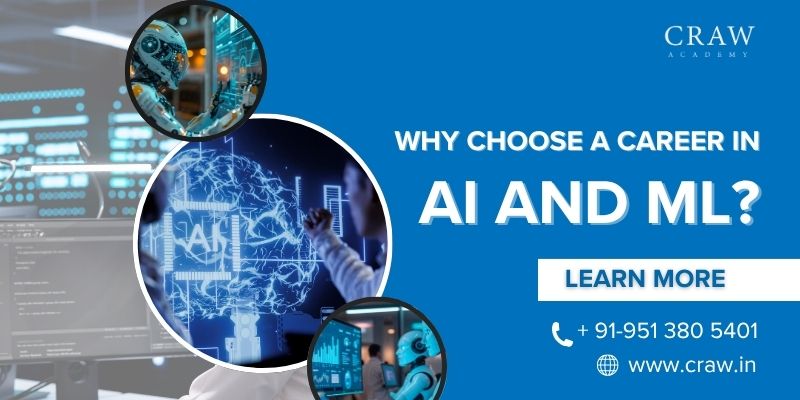How to Start a Career in AI and ML
In today’s rapidly advancing digital world, Artificial Intelligence (AI) and Machine Learning (ML) are among the most in-demand career fields. With sectors like healthcare, finance, education, and cybersecurity integrating AI at record speeds, skilled professionals are highly sought-after. Whether you’re a student, fresher, or career switcher, this guide will help you understand How to Start a Career in AI and ML—even with no prior experience.
Your Future Starts Here – Reserve Your FREE Demo Class Now!
What is AI and ML? What Are Their Benefits in 2025?
Benefits of AI and ML
1. Automation of Tasks
AI/ML can automate repetitive tasks, boosting productivity across industries like manufacturing, IT, healthcare, and finance.
2. Smarter Decision-Making
AI analyses massive datasets quickly, helping businesses make data-driven decisions with accuracy.
3. Personalized Experiences
From personalized shopping to tailored learning, AI/ML customize experiences based on user behavior.
4. Advanced Healthcare
AI assists in early disease detection, robotic surgeries, and personalized treatment plans using ML diagnostics.
5. Improved Cybersecurity
ML detects unusual patterns, helping prevent phishing attacks and ransomware threats in real time.
6. Better Job Opportunities
AI and ML have created thousands of jobs in fields like:
- AI engineering
- Data science
- NLP development
- Computer vision
- Robotics
7. Environmental and Social Impact
AI helps optimize energy usage, predict climate patterns, and even assist in disaster response and resource management.
8. Scalability for Businesses
AI tools help small and large businesses scale fast by automating marketing, support, and analytics.
Why Choose a Career in AI and ML?
Choosing a career in Artificial Intelligence (AI) and Machine Learning (ML) is more than just following a tech trend—it’s about preparing for a future that is rapidly being shaped by intelligent systems, data-driven decisions, and automation.
High Demand & Job Security
AI and ML professionals are among the most in-demand tech roles in 2025. Companies across every sector—healthcare, finance, e-commerce, cybersecurity, education, and logistics—are integrating AI and seeking skilled talent.
Cutting-Edge Innovation
AI and ML are at the heart of modern innovation—powering everything from chatbots and self-driving cars to predictive analytics and virtual assistants like ChatGPT.
Flexible Learning & Entry Routes
- Diverse Career Paths
AI/ML isn’t one-dimensional. Once trained, you can explore a wide range of roles:
- AI Engineer
- Machine Learning Developer
- Data Scientist
- NLP Specialist
- Computer Vision Engineer
- AI Cybersecurity Analyst
- AI Product Manager
Global Career Opportunities
AI/ML professionals are needed worldwide. With remote work rising, skilled individuals can work globally from anywhere—India, the US, Europe, or the Middle East.
Constant Learning & Growth
AI/ML fields evolve rapidly, making them perfect for curious minds. You’ll always be exploring new algorithms, tools, and possibilities.
Entrepreneurship & Freelancing
Many AI professionals become freelancers or build startups offering AI-driven solutions. It’s a field that supports independence, consulting, and innovation.
AI and Machine Learning Jobs for Freshers in India (2025)
As India embraces digital transformation, the AI and ML job market is booming with opportunities for freshers. With growing investment in smart technologies and data science, even entry-level professionals can now find meaningful roles that promise high growth and strong salaries.
Top Entry-Level AI/ML Job Roles for Freshers
| Job Role | Average Salary (INR) | Description |
|---|---|---|
| AI Engineer (Junior) | ₹6–10 LPA | Builds intelligent systems using algorithms and models |
| Machine Learning Engineer (Entry-Level) | ₹5–9 LPA | Develops predictive models and automation using data |
| Data Analyst (AI-focused) | ₹4–7 LPA | Analyzes and visualizes data patterns using AI tools |
| NLP Engineer (Beginner) | ₹5–8 LPA | Works with text and speech data using NLP models |
| Computer Vision Assistant | ₹6–9 LPA | Supports systems using image recognition, OpenCV, etc. |
| AI Research Intern | ₹15K–30K/month | Works with senior researchers on applied AI problems |
| Python Developer (AI Projects) | ₹4–6 LPA | Implements AI logic using Python libraries |
Future Scope of AI and ML Career in A New Era of Innovation
Artificial Intelligence (AI) and Machine Learning (ML) are no longer futuristic concepts—they’re actively reshaping how the world thinks, works, and lives. From smart assistants and self-driving vehicles to AI-powered fraud detection and personalized healthcare, the demand for intelligent systems is rapidly escalating. This momentum has opened a massive gateway of career opportunities, especially in countries like India, where digital transformation is accelerating.
What sets AI and ML careers apart is their interdisciplinary impact. Whether you have a background in computer science, mathematics, cybersecurity, biotech, or even psychology, there’s a niche in AI for you. As industries blend AI with IoT, blockchain, and edge computing, professionals with AI and ML expertise are becoming essential catalysts for innovation.
In 2025 and beyond, AI roles will evolve beyond coding—demand will grow for ethical AI specialists, AI auditors, and AI policy makers. India, with its vast tech talent pool and government initiatives like the IndiaAI Mission, is set to become a global hub for AI innovation. Add to this the explosion of startups and MNC investments, and it’s clear that AI and ML careers aren’t just future-ready—they are future-defining.
Whether you’re a student, fresher, or working professional, now is the ideal time to enter this high-impact, high-growth field. Institutes like bytecode in Delhi are already leading the charge by offering AI training integrated with cybersecurity, preparing learners for the next generation of tech challenges.
Essential Skills to Start a Career in Artificial Intelligence (AI)
Artificial Intelligence is one of the most powerful and promising career fields of our era. To launch a successful AI career, you need to master a blend of technical, analytical, and practical skills. Here are the must-have skills every aspiring AI professional should focus on in 2025:
- Programming Skills (Python is King)
- Mathematics & Statistics
- Machine Learning Fundamentals
- Deep Learning & Neural Networks
- Data Handling and Preprocessing
- Natural Language Processing (NLP)
- Cloud & Big Data Tools
Best Online Courses for AI and ML with Placement Support
Choosing the right AI and ML course can significantly boost your job prospects, especially when the program includes hands-on projects, certifications, and career support. Below are some of the top-rated online AI/ML training programs that offer placement assistance, ideal for freshers and career switchers.
bytecode – AI & ML Certification with Placement (Delhi-Based with Online Mode)
Why Choose It:
- Offers AI training integrated with Cyber Security and Real-Time Projects
- Placement Assistance with resume building and mock interviews
- Covers Python, TensorFlow, NLP, Computer Vision, and Generative AI
- Flexible online batches with live mentorship
- Industry-ready capstone projects
- Ideal For: Beginners, students, and freshers wanting job support in India or abroad
How to Prepare for an AI and ML Career as a Student
With Artificial Intelligence (AI) and Machine Learning (ML) revolutionizing industries, students have a golden opportunity to prepare early and enter one of the most sought-after fields in tech. Whether you’re from a computer science background or a completely different stream, you can start building your AI/ML career step-by-step while still a student.
Eligibility Criteria for AI and Machine Learning Jobs
Starting a career in Artificial Intelligence (AI) and Machine Learning (ML) requires a mix of academic background, technical skills, and practical exposure. Whether you’re a fresher or transitioning from another tech field, here’s what you need:
| Criteria | Details |
|---|---|
| Educational Qualification | A Bachelor’s degree in Computer Science, Information Technology, Mathematics, or Engineering is commonly required. Some roles may accept other science or tech-related backgrounds. |
| Programming Knowledge | Strong command over Python is essential. Knowledge of R, Java, or C++ is a plus. |
| Mathematics & Statistics | Understanding of Linear Algebra, Calculus, Probability, and Statistics is critical for ML models. |
| Data Handling Skills | Familiarity with data preprocessing, cleaning, and visualization using tools like NumPy, Pandas, Matplotlib. |
| AI/ML Algorithms Knowledge | Basic understanding of Supervised, Unsupervised, and Reinforcement Learning techniques. |
| Machine Learning Libraries | Hands-on experience with TensorFlow, Keras, PyTorch, Scikit-learn is often expected. |
| Project Experience | Even small capstone projects, internships, or personal GitHub projects add significant value. |
| Certifications (Optional) | Certifications from platforms like Bytecode, Craw Security enhance your profile. |
| Soft Skills | Critical thinking, problem-solving, communication, and continuous learning mindset are essential. |
| Optional Extras | Familiarity with cloud platforms (AWS, Azure, GCP), Big Data tools, or DevOps practices gives a competitive edge. |
Real-World Applications of AI and ML
Healthcare
AI and ML are revolutionizing the healthcare sector by enabling faster, more accurate diagnostics and improving patient outcomes. From detecting diseases through medical imaging to predicting patient readmissions using historical data, AI is helping doctors make better decisions. ML algorithms are also used in drug discovery, robotic surgeries, and AI-powered chatbots that assist patients with medical queries 24/7.
Finance
In the financial sector, AI and ML play a critical role in fraud detection, credit scoring, and algorithmic trading. Banks and fintech companies use ML models to detect unusual transactions, predict credit risk, and automate loan approvals. Robo-advisors and chatbots provide personalized financial advice, while stock market predictions powered by AI assist investors in making informed decisions.
E-commerce
AI and ML are at the core of modern e-commerce platforms. From personalized recommendations to intelligent search engines and dynamic pricing strategies, AI enhances user experience and boosts sales. Customer segmentation, sentiment analysis, and demand forecasting are just a few examples of how retailers use AI to understand and serve their consumers better.
Education
Education is being transformed by AI through personalized learning paths, intelligent tutoring systems, and automated grading. Machine learning models analyze student performance to identify areas where support is needed, enabling early interventions. AI-driven platforms adapt content in real-time, offering tailored experiences that improve student engagement and outcomes.
Automotive
Self-driving cars are one of the most talked-about applications of AI in the automotive industry. AI systems process massive amounts of sensor data to make real-time driving decisions. Additionally, AI is used for traffic prediction, driver behavior monitoring, predictive vehicle maintenance, and enhancing in-car virtual assistants for safer and smarter mobility.
Agriculture
AI and ML are playing an increasingly important role in modern agriculture. Technologies like drone-based crop monitoring, soil analysis, and pest detection systems help farmers increase yields while reducing resource usage. AI also assists in weather prediction, irrigation planning, and smart farming decisions that improve overall efficiency.
Cybersecurity
In cybersecurity, AI is a game-changer. Machine learning algorithms can detect suspicious activity, flag anomalies in network behavior, and respond to threats faster than human analysts. AI is also being integrated into firewalls, antivirus tools, and fraud prevention systems to build stronger, more adaptive security frameworks.
Retail
Retailers use AI to forecast demand, optimize inventory, and provide a seamless shopping experience. In-store analytics, facial recognition for personalized service, and smart checkout systems powered by AI are improving operational efficiency and customer satisfaction. AI also plays a major role in marketing automation and customer relationship management.
Manufacturing
In the manufacturing industry, AI enhances productivity and quality through predictive maintenance and automation. ML algorithms predict equipment failures before they happen, reducing downtime. Computer vision systems check product quality on the assembly line, ensuring consistency and reducing human error in the production process.
Media & Entertainment
AI and ML are transforming how content is created, curated, and consumed. Streaming platforms like Netflix and Spotify use AI to recommend shows and music tailored to user preferences. In media production, AI tools help in video editing, scriptwriting, and even generating realistic deepfake content for films and advertisements.
Smart Cities
AI is helping build smarter, more efficient cities by optimizing traffic flow, reducing energy consumption, and improving public safety. AI-powered surveillance, automated waste management, and intelligent public transport systems are just a few ways cities are using AI to improve urban life.
Challenges Faced by Beginners in AI Career
| S.No | Challenge | Description |
|---|---|---|
| 1 | Lack of Clear Learning Path | Beginners often feel lost due to AI’s vastness—covering ML, deep learning, NLP, and more—without structured guidance or curriculum. |
| 2 | Strong Mathematical Foundation Required | AI relies on linear algebra, calculus, and statistics, which can be difficult for those without a strong math or engineering background. |
| 3 | Coding and Programming Skills | Many beginners lack experience with Python and core programming concepts like loops and data structures, which are essential for AI. |
| 4 | Lack of Practical Experience | Focusing too much on theory and not enough on projects makes it hard for beginners to showcase problem-solving abilities in real-world scenarios. |
| 5 | Rapidly Evolving Technology | Constant updates in AI tools and frameworks make it tough for learners to stay current, leading to outdated skills. |
| 6 | Computational Resource Limitations | Limited access to GPUs and large datasets can hinder the ability to practice complex AI models and real-world experimentation. |
| 7 | Job Market Competition | With more people entering the AI field, it’s difficult to stand out without portfolios, certifications, or internships. |
| 8 | Understanding AI Ethics and Bias | Beginners often overlook ethical issues like data bias, fairness, and transparency—critical components in today’s AI job roles. |
| 9 | Lack of Mentorship and Guidance | Absence of expert mentorship and peer support leads to confusion, stagnation, and even dropping out of learning paths. |
| 10 | Mismatched Expectations | Unrealistic beliefs about quick success or high pay lead to disappointment when learners realize AI mastery takes time, patience, and practice. |
To overcome the hurdle of theoretical learning without experience, Bytecode focuses heavily on project-based learning and offers internship-integrated training that ensures real-world exposure. The institute is also proactive in keeping up with emerging AI technologies, updating its modules regularly to reflect industry standards. For students with limited resources, Bytecode provides cloud-based labs and tools, removing dependency on high-end hardware. Furthermore, the institute enhances employability by offering placement assistance, mock interviews, and portfolio-building support to help students stand out in a competitive job market.
Frequently Asked Questions (FAQs)
Q. What is Artificial Intelligence (AI)?
Artificial Intelligence (AI) refers to the ability of a computer or machine to mimic human-like intelligence. This includes tasks such as decision-making, language understanding, visual perception, and learning from experience.
Q. What is Machine Learning (ML)?
Machine Learning (ML) is a subset of AI that enables computers to learn from data without being explicitly programmed. ML algorithms identify patterns, make predictions, and improve automatically with experience.
Q. How do I start an AI career with no experience?
Start by learning Python, math basics, and enrolling in practical AI/ML certification courses. Build projects to showcase your skills.
Q. Can a fresher get a job in AI and ML?
Yes, freshers with the right skills, certifications, and project experience can land entry-level AI/ML roles.
Q. What is the salary of fresher AI in India?
Fresher salaries range from ₹4.5 LPA to ₹8 LPA, depending on skills, certifications, and project exposure.
Q. Is AI ML in demand?
Yes, AI and ML are highly in demand across industries, with job opportunities growing rapidly in India and globally.
Q. How to qualify for AI jobs?
Gain skills in Python, machine learning, math, and tools like TensorFlow. Build a strong project portfolio and earn certifications.
Q. Is AI a good career for girls?
Absolutely. AI offers high pay, flexible work, and great opportunities, making it a strong and inclusive career choice for girls.
Q. Which AI course has the highest salary?
Advanced certifications like Bytecode’s AI+ML program, Deep Learning Specialization, or Google AI courses lead to top-paying jobs.
Q. How to start a career in machine learning and AI?
Learn coding and math, take AI/ML courses, build projects, join bootcamps, and apply for internships or junior roles.
Q. Will AI replace cyber security jobs?
No. AI will support but not replace cybersecurity jobs. Human expertise is still critical in managing threats and systems.
Q. Which degree is best for AI and ML?
Degrees in Computer Science, Data Science, AI, or Mathematics are ideal, but certifications and skills matter more than the degree.
Conclusion
Starting a career in Artificial Intelligence (AI) and Machine Learning (ML) in 2025 is not just a smart decision—it’s a strategic investment in your future. As industries increasingly adopt AI-driven solutions, the demand for skilled professionals continues to soar across the globe. Whether you’re a student, fresher, or career switcher, entering the AI/ML space opens doors to innovation, global job opportunities, and long-term career growth.
While the journey comes with its challenges—like mastering complex math, coding, and keeping up with evolving tech—these can be overcome with the right guidance, hands-on experience, and consistent learning. Institutes like Bytecode make this journey smoother by offering structured training, real-world projects, placement support, and mentorship tailored to both beginners and professionals.
With the right mindset, skills, and support system, you can confidently step into one of the most impactful and rewarding careers of the digital age. Now is the time to act—equip yourself with AI/ML expertise and become part of the intelligent future shaping industries and societies worldwide.
Your Future Starts Here – Reserve Your FREE Demo Class Now!







